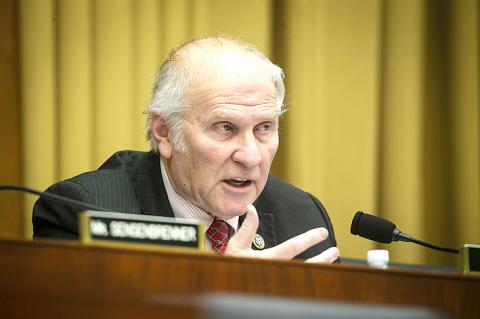US Representative Steve Chabot, co-chair of the Congressional Taiwan Caucus, on Thursday proposed a resolution asking the US government to counter Beijing’s “one China” principle.
In the resolution, Chabot said that the US’ “one China” policy is not equivalent to Beijing’s “one China” principle, as the former is based on the full implementation of the Taiwan Relations Act and the Three Joint Communiques it negotiated with Beijing, with a focus on peaceful resolution of Taiwan’s status.
“In the Three Joint Communiques, the United States only acknowledged, without endorsing, the PRC’s [People’s Republic of China] claim that there is but one China and Taiwan is part of China,” the resolution said.

Photo: Bloomberg
“However, the PRC has actively sought to assert its one China principle over any other position on Taiwan’s status, including the US’ one China policy,” it said.
It is in the US’ national interest for the resolution of Taiwan’s status to be peaceful and respectful of the nation’s thriving democracy, the resolution said, adding that Beijng’s “one China” principle fails to reflect the “objective state of affairs” that the government represents a democracy of 23.6 million people.
The resolution also listed some of the predicaments Taiwan has faced due to Chinese pressure, including its exclusion from the WHO and other international organizations, loss of diplomatic allies and Chinese President Xi Jinping’s (習近平) plan to adopt a “one country, two systems” model for unification.
“The PRC’s persistent and increasing authoritarianism, and Taiwan’s consolidation of its democracy place the PRC and Taiwan on divergent paths and make unification less likely,” it said.
The resolution urges constructive cross-strait dialogue without preconditions, and urged other countries and international organizations to refrain from acquiescing to Beijing’s “one China” principle.
The Ministry of Foreign Affairs yesterday thanked Chabot for his support, saying that it would pay close attention to developments.
“We will continue to play our role as a responsible and actively contributing member of the international community,” the ministry said, calling on other nations to support Taiwan’s democracy so that it can continue to shine.
Mike Kuo (郭正光), president of the Washington-based Formosan Association for Public Affairs, called Beijing’s “one China” principle a “bizarre and irrational fiction.”
It is time for the US government to proactively challenge the “one China” principle and rethink support for its “one China” policy, he said.

Chinese spouse and influencer Guan Guan’s (關關) residency permit has been revoked for repeatedly posting pro-China videos that threaten national security, the National Immigration Agency confirmed today. Guan Guan has said many controversial statements in her videos posted to Douyin (抖音), including “the red flag will soon be painted all over Taiwan” and “Taiwan is an inseparable part of China,” and expressing hope for expedited reunification. The agency last year received multiple reports alleging that Guan Guan had advocated for armed reunification. After verifying the reports, the agency last month issued a notice requiring her to appear and explain her actions. Guan

A preclearance service to facilitate entry for people traveling to select airports in Japan would be available from Thursday next week to Feb. 25 at Taiwan Taoyuan International Airport, Taoyuan International Airport Corp (TIAC) said on Tuesday. The service was first made available to Taiwanese travelers throughout the winter vacation of 2024 and during the Lunar New Year holiday. In addition to flights to the Japanese cities of Hakodate, Asahikawa, Akita, Sendai, Niigata, Okayama, Takamatsu, Kumamoto and Kagoshima, the service would be available to travelers to Kobe and Oita. The service can be accessed by passengers of 15 flight routes operated by

GIVE AND TAKE: Blood demand continues to rise each year, while fewer young donors are available due to the nation’s falling birthrate, a doctor said Blood donors can redeem points earned from donations to obtain limited edition Formosan black bear travel mugs, the Kaohsiung Blood Center said yesterday, as it announced a goal of stocking 20,000 units of blood prior to the Lunar New Year. The last month of the lunar year is National Blood Donation Month, when local centers seek to stockpile blood for use during the Lunar New Year holiday. The blood demand in southern Taiwan — including Tainan and Kaohsiung, as well as Chiayi, Pingtung, Penghu and Taitung counties — is about 2,000 units per day, the center said. The donation campaign aims to boost

The Central Weather Administration (CWA) said a magnitude 4.9 earthquake that struck off the coast of eastern Taiwan yesterday was an independent event and part of a stress-adjustment process. The earthquake occurred at 4:47pm, with its epicenter at sea about 45.4km south of Yilan County Hall at a depth of 5.9km, the CWA said. The quake's intensity, which gauges the actual effects of a temblor, was highest in several townships in Yilan and neighboring Hualien County, where it measured 4 on Taiwan's seven-tier intensity scale, the CWA said. Lin Po-yu (林柏佑), a division chief at the CWA's Seismological Center, told a news conference